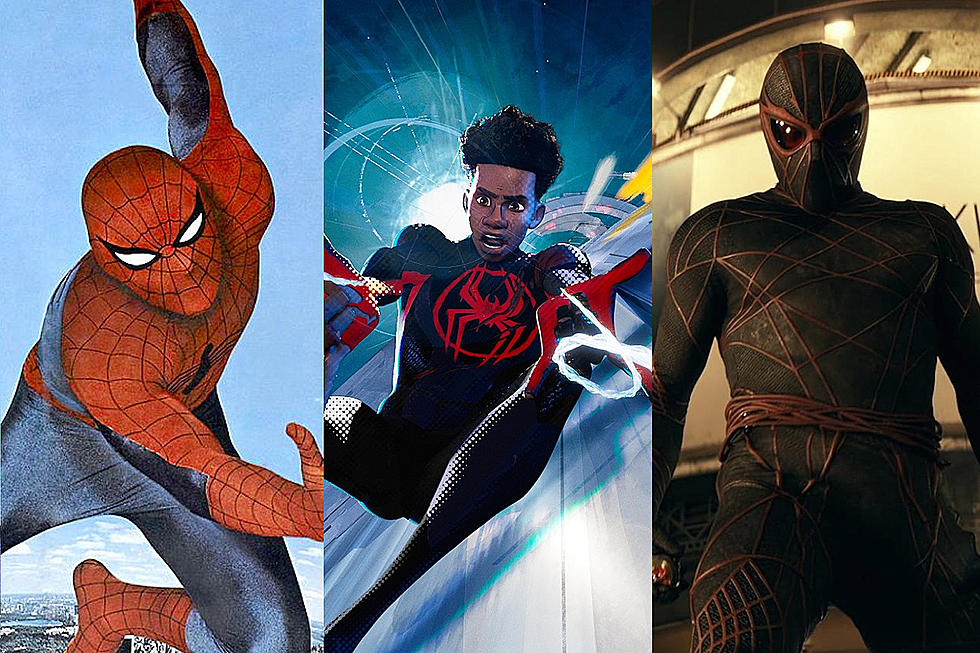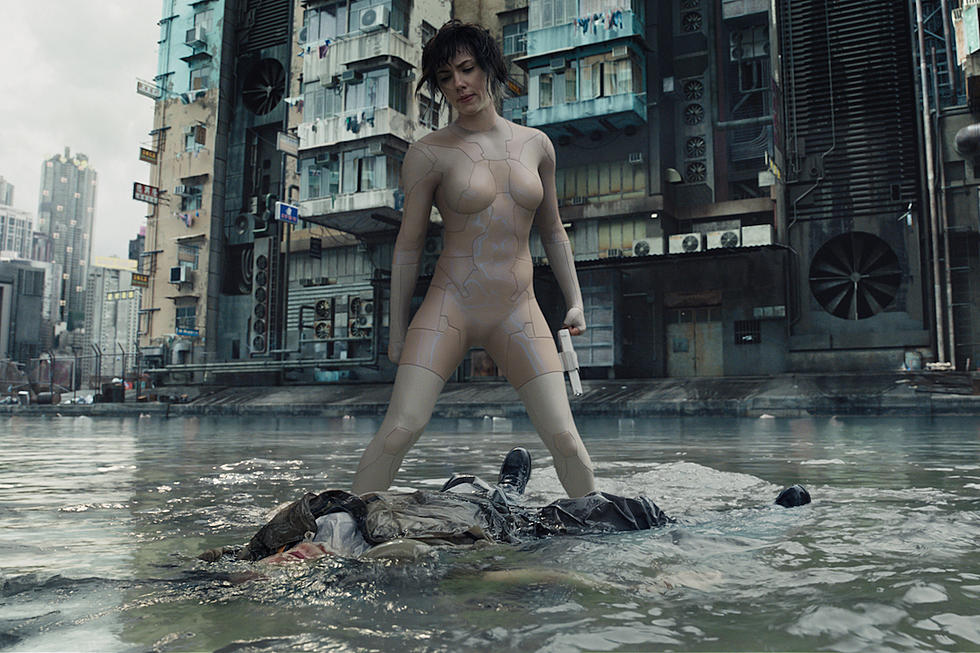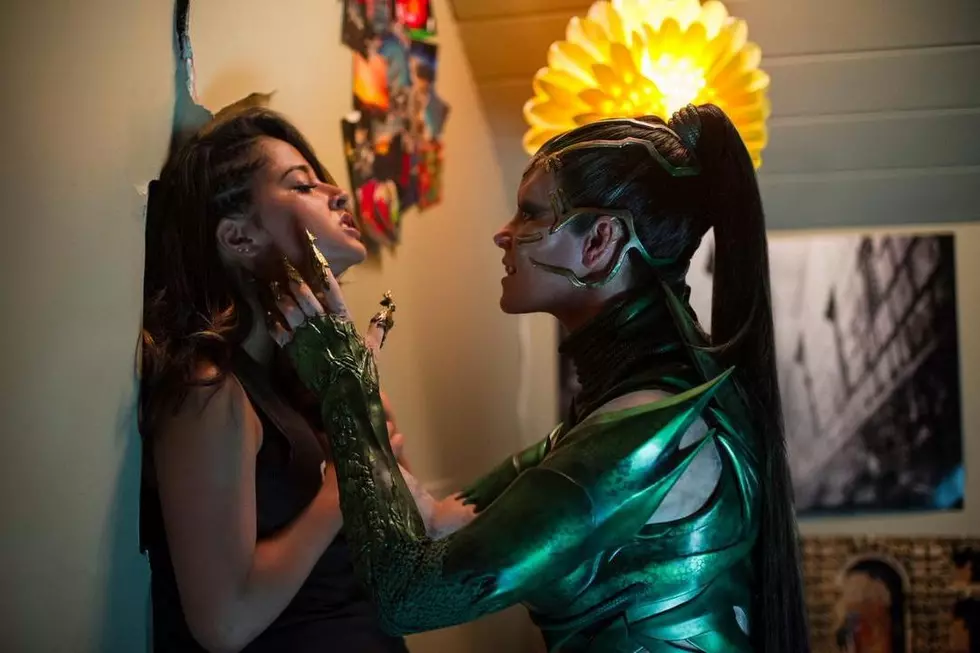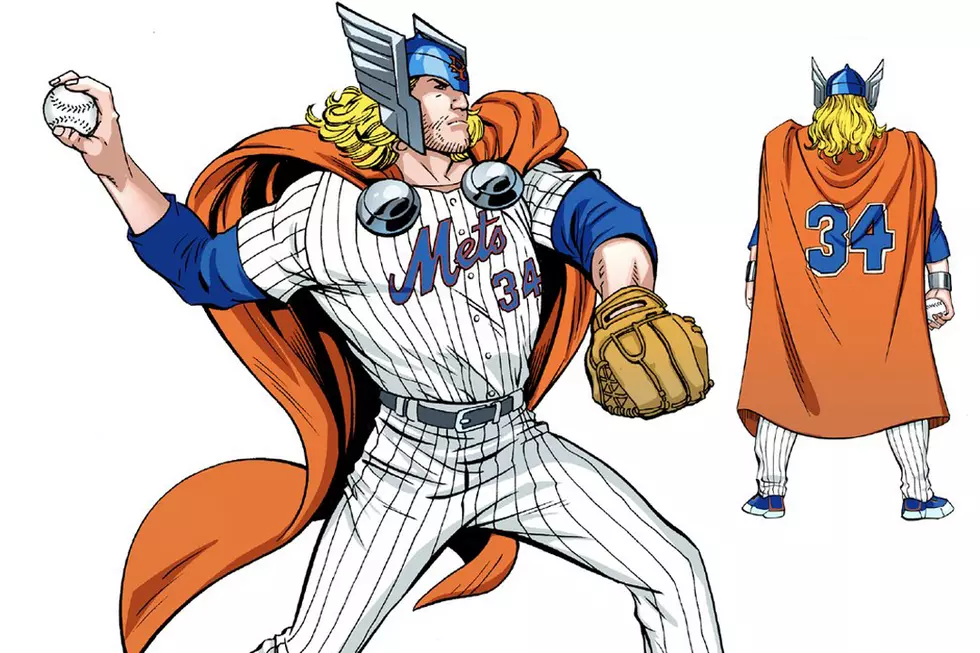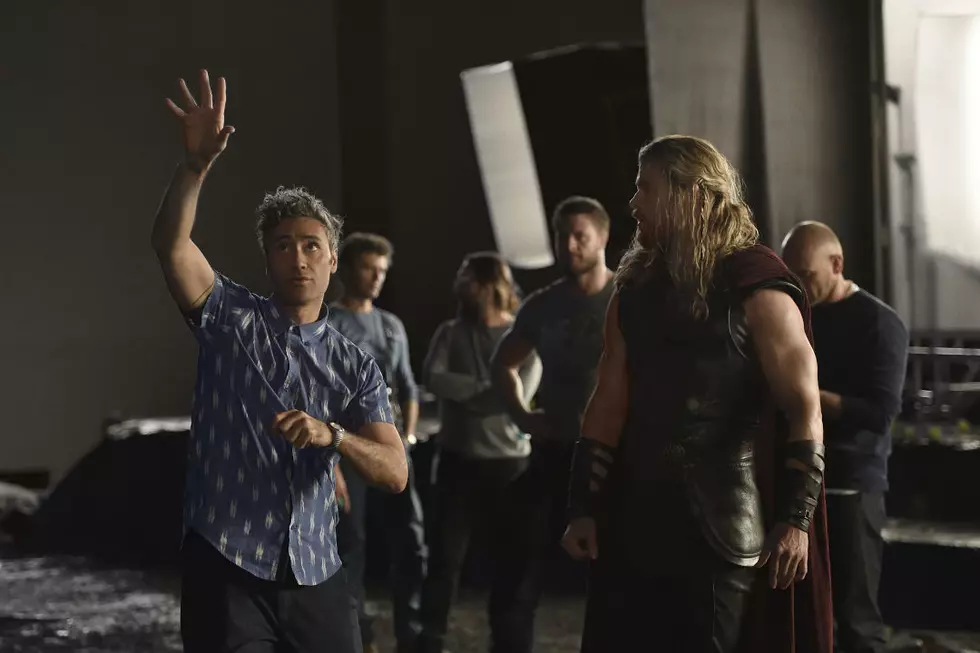![The ‘Thor’ Movie Brings a Marvel Epic to the Big Screen [Review]](http://townsquare.media/site/622/files/2011/05/thor01.jpg?w=980&q=75)
The ‘Thor’ Movie Brings a Marvel Epic to the Big Screen [Review]

Last week, I was talking to Chad Bowers, my writing partner, and we got to talking about how excited we were for the Thor movie. I've been looking forward to it for a while, but Chad went so far as to tell me that if he had a time machine that he could use to bring his 12-year-old self to 2011 and show him one thing out of all the wonders we have here in the 21st century, it would definitely be a live-action movie where the God of Thunder fought the Destroyer.
I figured he was joking, but the more I thought about it, the more I realized that he was totally serious. And having seen Thor over the weekend, I'm pretty sure that's the right decision, because this movie is awesome. And not just because the Destroyer blows up cars with his face.The broad strokes of the story should be pretty familiar to anyone who's read the comics: Thor is arrogant and plans on spending his tenure as King of Asgard doing nothing but beating frost giants to death with a hammer, which one imagines would not sit well with the frost giants. Thus, Odin exiles him from Asgard to learn humility, which he does, and then he fights Loki and eventually hits something with his hammer so hard that everything works out more or less okay. That's what we all know going into the theater, but what makes it so great is how everything comes together to blend epic adventure with smaller, more personal interactions into a movie that genuinely captures what's great about the Marvel universe.
I imagine that for a lot of people, Thor's relationship with the rest of the Marvel Universe can be difficult. After all, while most Marvel characters are built to be someone the average person can relate to, Thor is the actual thousand year-old God of Thunder, a role that requires him to have adventures on a grand, fate-of-the-world scale. It's not always easy to reconcile that when he exists in a world where the most popular character is a guy who has to sell pictures of himself to a very angry man in order to pay off his aunt's mortgage.
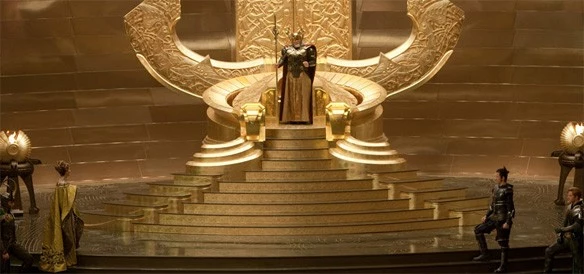
With Thor being one of the lead-ins of the upcoming Avengers movie, the flmmakers were presented with a similar problem, in that they had to capture the mythological grandeur of a character who fights for the entire universe without having him overshadow the relatively smaller problems of guys like Iron Man. He has to be believable as a teammate for the other characters, and so the solution came in actually dividing the movie into two parts that have almost nothing to do with each other.
In Asgard, the conflicts are huge. Thor, Sif and the Warriors Three battle a horde of Frost Giants, Loki schemes to usurp his brother and take control of an entire kingdom of gods, there are ancient relics and forgotten weapons that could crush entire realms, and the entire plot is driven by a desire for revenge that's been building for a thousand years. Even the sets, and backgrounds, done in a beautifully over-the-top Kirbyesque blend of technology and magic, seem gigantic and majestic. Odin sits on a literal golden throne in a massive, towering castle, and when the Asgardians go to Jotunheim, they land on a vast plain of ice that stretches for miles.
When Thor is exiled to Earth, though, things immediately get smaller.
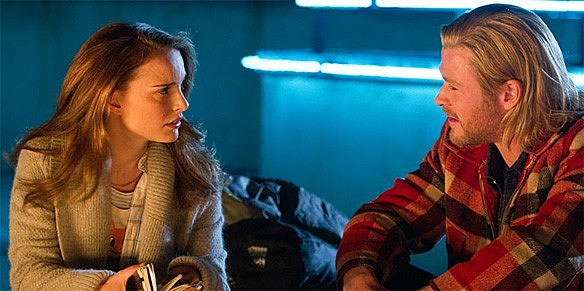
Everything from the town he's in -- of which we only ever see one street -- to the cast of characters suddenly shrinks to something closer and more confining. As a result, every time the scene shifts from Asgard to Earth, it's also shifting from the big to the small, and from the epic to the personal. The film is forced by Thor's circumstances to become more introspective, showing his relationship with Jane Foster and how he changes on a very small, very personal level.
The overall effect is that it really feels like it strikes a balance that makes Thor work on a level that we can identify with without sacrificing that godly grandeur that makes him what he is. It makes Thor the one connection between each of these worlds, so that when the two stories finally connect, the stakes feel high for the mortal characters even though, by all rights, they're not. Loki's master plan to destroy Jotunheim has absolutely nothing to do with Earth, and even when the Destroyer is rampaging through New Mexico -- where there's a billboard inviting tourists to "Journey Into Mystery," which I thought was a nice touch -- the only people in any real danger are Thor, Sif and the Warriors Three. But the emotional resonance is there, both in that conflict, and later when Thor realizes that feeling compassion for others means giving up something of himself, which helps give his isolation in Asgard at the end emotional impact purely through storytelling, even when we know he'll be stomping around Earth again by next summer.
It also helps that the movie doesn't really feel weighed down by its status as one of the building blocks of Avengers, which I think was accomplished -- counterintuitively -- by giving Clark Gregg's SHIELD Agent Coulson a bigger role in this one. I liked Iron Man 2 quite a bit, but one of the biggest problems with that film is how awkward it is in trying to connect Iron Man to the larger universe. As silly as it is, there's a part of me that really likes the idea of Tony Stark going down into his basement with a wrench and a laser beam and coming out with a new element -- "Tony Stark made a new element a pipe wrench!" being the only way you could possibly top "Tony Stark was able to build this in a cave!" -- but having Nick Fury show up as a one-eyed deus ex machina to basically tell him how to do it undercuts Stark's character.
Coulson, meanwhile, is integrated into this movie right from the start as the guy saddled with having to deal with all this nonsense. His glum "nobody tells me anything" line from the trailer does a lot to sell him as a viewpoint character that works within this increasingly kooky world, and having him stick around as a constant presence really helps to find continuity. It's not perfect -- his decision to release Thor from custody was completely illogical, and while he wasn't as obtrusive as I thought, Hawkeye's appearance was a little out of place and probably felt awkward for audience members who don't know who Hawkeye is -- but it's a big improvement over what we've seen, and it works pretty well.
But what really sells that story is the fact that Kenneth Branagh gets some great performances out of his cast.
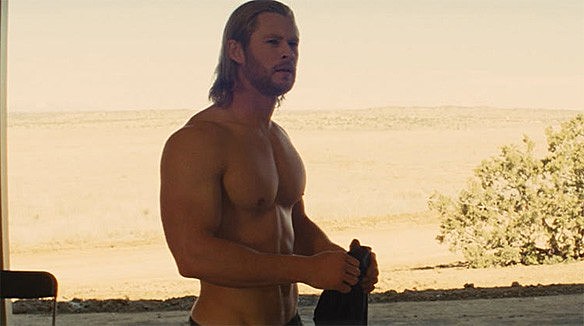
There wasn't a single actor in this movie that I didn't think was good, but Chris Hemsworth -- seen above with his shirt off, because seriously, that dude is unreal -- was a huge surprise. He could've easily oversold either aspect of his character, but he brought a genuine charm to the role both as the cocky warmonger he is at the start of the film and in the slow change to the hero he becomes that helps it all feel like real development rather than a manufactured arc. When he's trying to convince his friends to go on what essentially amounts to a suicide mission, there's an affability to him that helps you understand why they'd totally do it. He sells it perfectly.
And speaking of the other characters, forget about Avengers, man. I want a Tales of Asgard movie about Sif, Heimdall and the Warriors Three.
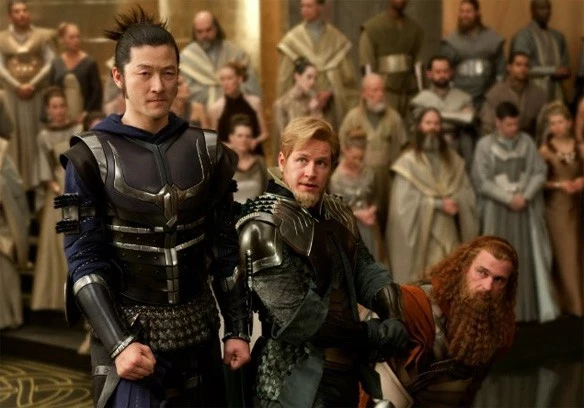
In a lot of ways, Thor is an origin story, but it's nice that Branagh's version tells of a change in Thor's life rather than just starting at the beginning. He's willing to let a lot of the backstory between these characters go untold, instead letting it come out through dialogue. The downside, though, is that for me, there just wasn't enough of them, even if what there was is pretty great. I mean, honestly, their plan for fighting the Destroyer was "throw Volstagg at it." That's fantastic. I'd watch a movie about those guys running around with Sif and Heimdall, fighting Malekith or Skurge the Executioner and the Enchantress in a heartbeat.
The real standout, though, was Tom Hiddleston's Loki.
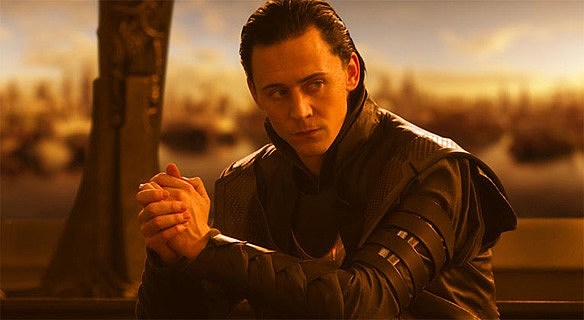
Given Branagh's history as a Shakespearean actor and director, it's not really surprising that he'd gravitate towards giving Loki a character arc that feels like it draws from Macbeth, and Hiddleston does wonders with it. The script underlines Loki's knack for dealing in lies and trickery -- now that I think of it, I don't think he says a single true thing in the movie -- but as his betrayal becomes a double-cross, then a triple-cross, then a quadruple-cross, Hiddleston gives the role an incredible humanity. Like the best villains, he manages to convey a sense of having a legitimate reason for everything he does. You understand him, even though his actions seem skewed, and that becomes the best trick of the whole movie, that the villain who's completely and unrepentantly evil in every way is so enjoyably easy to identify with.
Of course, the movie's not without its flaws. As enjoyable as Anthony Hopkins is as Odin, his descent into the Odinsleep comes on pretty suddenly and without much explanation, and I was a little disappointed that Balder, who possesses the signle greatest hat in all of Asgard, didnt' make a single appearance. Overall, though, I thought it was great -- and it's the first movie they've done that makes me think Avengers could actually pull it off.
More From ComicsAlliance
